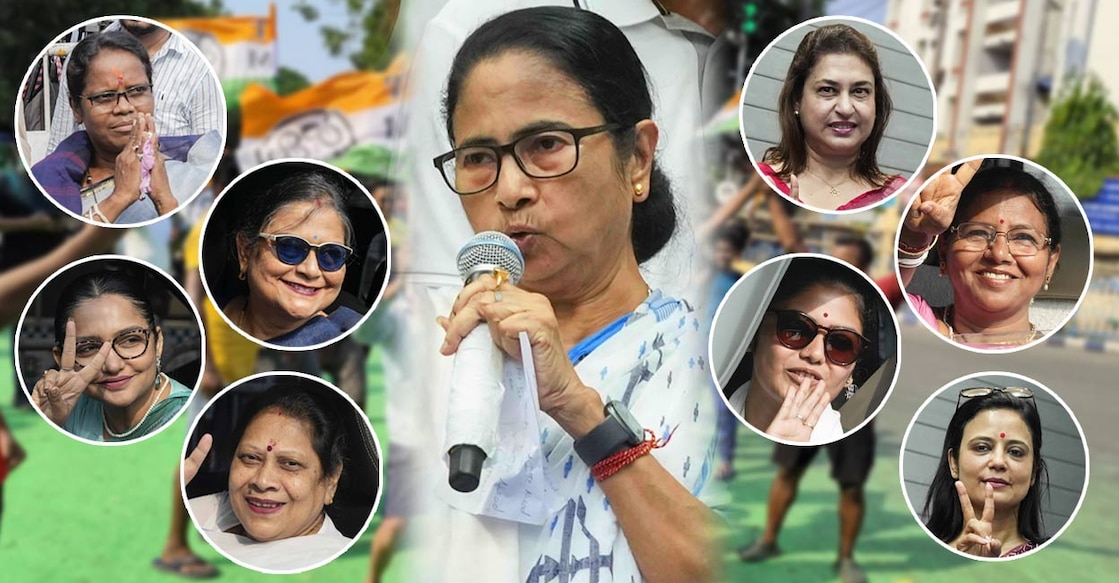Women brigade versus muscle power: What stands out in TMC's power dynamics

Mail This Article
The BJP's upswing in West Bengal has tossed up several theories since the Lok Sabha verdict in 2019. CPM's vote share eroded yet again and it turned out to be BJP's gain. In 2019, the vote share of the BJP was 40.06 per cent. For the CPM, which had zero seats, the vote share stood at 6.3 per cent. In contrast, the vote share of the BJP in this election went down to 38.73 per cent and CPM and Congress also saw them plummet further to 5.6 per cent and 4.68 per cent respectively. One would doubt the veracity of the vote-drain thesis in this light. But that is true, according to Biswanath Chakraborty, a senior political analyst in West Bengal told Onmanorama.
He says that this time too the BJP's vote share remained almost the same and vote-flow from the CPM is a reality. Another theory, which is circulating outside the state and contended by Chakraborty is that the 'woman factor' in TMC had a major say in the party's outstanding performance in the state.
Of the 42 TMC candidates, who contested in the recently concluded Lok Sabha elections in West Bengal 12 were women, the highest representation of the gender by any party in a state in this election to the Lower House. The women brigade included high-profile candidates to those with least or no political identity. Among them, only one candidate failed to make the cut and that too was a close contest. Sujata Mondol, the first-time candidate who represented Bishnupur, lost by a margin of only 5,567 votes.
Mahua Moitra shines in the power-packed female candidates' list for all the media glare she grabbed at the national level. She registered a thumping victory in Krishnanagar constituency by a margin of 56705 votes. The star candidate, who had a stint with the investment banking behemoth JP Morgan Chase in New York and London, had represented Karimpur constituency in the West Bengal state assembly from 2016 to 2019.
Sayani Ghosh, an actress-turned-politician, won the Jadavpur constituency, and stole the show with a huge winning margin of 258201 votes. She had earlier tasted drubbing in the 2021 West Bengal Assembly elections representing Asansol South. Rachana Banerjee, June Maliah and Shatabdi Roy were among the other star candidates. Mitali Bag who won from Arambagh and a representative of the oppressed class, Dr Sharmila Sarkar, Dr Kakoli Ghosh Dastidar and Pratima Mondal are other candidates who extended TMC's winning streak.
BJP too had fielded seven women in this election but none of them won. They included big wigs like former Union minister Debasree Chowdhury, who contested from the quintessential cosmopolitan seat of Kolkata Dakshin, Agnimitra Paul who had said that her TMC rival June Maliah 'will say bye in June' at a campaign rally, Locket Chatterjee and new comers like Amrita Roy and Rekha Patra who lost the widely noticed Basirhat constituency. But, June, a political novice, did justice to the faith reposed in her by the party and won the Medinipur seat by a margin of 27791 votes.
Sajda Ahmed, widow of Sultan Ahmed, former minister of state for tourism in the Manmohan Singh government, was another remarkable candidate who posted a landslide victory in Uluberia by a humongous margin of 2,18,673 votes. Mala Roy, a seasoned politician, lifted TMC's profile high by winning the Dakshin Kolkata seat defeating her nearest rival Debasree Chaudhuri by a margin of 155,192 votes. Meanwhile, Satabdi Roy in her re-election from Birbhum added another feather to TMC's cap as she won the seat by 2,18,673 votes against her BJP rival.
However, Chakraborty is of the view that those who are outside West Bengal are least aware of the real power play in the state. "The political scenario is completely controlled by muscle and money power of the ruling party. It's not entirely a democratic procedure that's going on," he says. The list of candidates in the TMC camp swells with names of women just because they are the personal choices of the TMC leadership. The edge in the number of women candidates has nothing to do with the way the party fared in the election. "It will be a simplistic conclusion to say so. The result would have been the same, even if the candidates had been men. It's the 'Mamata' factor that always looms large over anything else," he says, “and, of course, her social welfare schemes too had an impact.”
"Be it any party, it's the control over the police, the muscle power unleashed by leaders' henchmen and money, which determine a party's continuity in power. TMC is no different. They go to any extent to ensure a government without an opposition,'' Chakraborty says.
"It is quite evident in the Panchayat elections in the state in 2023 in which over 50 people had lost their lives in clashes between rival party workers as well as internal skirmishes. Even the women empowerment card comes secondary when the thirst for power reigns supreme,'' he says.
He points out that when the Congress campaign spearheaded by Rahul Gandhi entered West Bengal, the demand for four seats in the quest for a poll alliance was raised again. '' The seat-sharing proposal was struck down outright as Mamata knew that the Congress was never going to make any major gains in the state,'' he says.
The lone seat won by the CPM-Congress combine came through Isha Khan of the latter who contested from Malda Dakshin. The BJP couldn't even win the Basirhat constituency, which encompasses Sandeshkhali, a village island, which has been constantly in the spotlight for quite some time now for the agitation by locals against atrocities meted out to them by goons and TMC workers. But, SK Nurul Islam of TMC won by a huge margin of 3,33,547 votes.
Now that INDIA block is in a celebratory mode for dealing an impactful blow to the NDA, does TMC have any regrets? "No way," says Chakraborty and asks echoing the sentiment of the TMC camp, "What's the point in standing by a side which is in the Opposition and with no power?"


